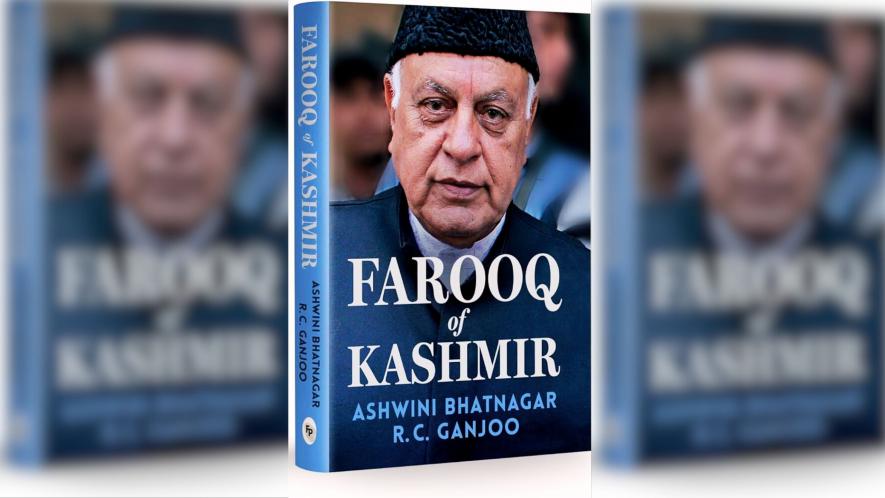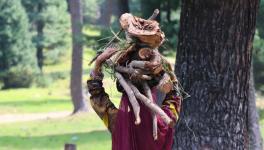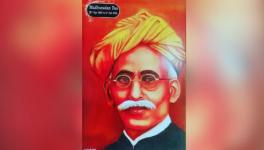An Unsteady Continuous See-Saw in Kashmir Politics

Book. Image Courtesy: Amazon.in
Sometime in mid-1990, a BSF officer came across a half-burnt diary of a Kashmiri Pandit while inspecting the malkhana (storeroom) of the post. The diary was recovered from a burned down house in Srinagar. A mere turning of its pages brings the lived terror and its trauma alive to the reader.
The diary gives a heart-rending description of the prevailing situation in first person. The pages record the pain of the days the unidentified Kashmiri Pandit had spent holed up inside his house while awaiting an inevitable gory end. The diary starts with the departure of his family from Srinagar.
Some excerpts from the diary:
“There is no electricity again tonight. They switch off the lights as soon as evening descends and then crowds gather at mosques. There is one speech after another and … slogans of humko kya chahiye—azadi, azadi (We want freedom), Hindu bhag jao (Run away you Hindus) and cries of Allah-hu-Akbar. It is very frightening.
“Curfew, firing, burning of houses, the constant screech of police vehicles and azadi slogans have filled our days for some time now. They have held us prisoners. Girija and children couldn’t have withstood the strain any longer. It is good they left. I couldn’t go because of my posting here…
“… As I sit alone in candlelight, waiting for dawn to break, memories rush to light up my mind with sparkling moments. I remember my childhood and the many Muslim friends and their families.
“… I have not gone out of the house for a week now. Curfew and constant firing have forced me to remain indoors. Oh, how I wish to break free of these walls and roam around my valley once again…
“Today, I went to Lal Chowk after a long time to buy some provisions. The shopkeepers looked at me incredulously. Nobody said anything but as I moved around, I would hear the unspoken words, ‘Why are you still here. Why haven’t you fled?’ They were asking me through their loud silence. As I was completing my shopping, the loudspeaker began to crackle. The first cry of Allah-hu-Akbar burst forth. Suddenly, all the people around me started rushing towards the mosque for their afternoon prayers. It seemed as if a magnet had been switched on, and they couldn’t help but rush towards it. It was surreal. I had never seen anything like this before…
“What has happened to the people?
“My Muslim neighbour told me that in a few days everything would be under the direct control of the mujahideens. Allah’s men, he said, had all the desirable qualities of providing a just and fair government… There is violence on the face of the Muslims. Their slogans are sectarian. It looks as if Kashmir belongs to the Muslims only.
“… My community failed to grasp the import of these gruesome happenings. Many had earlier dismissed them as cases of personal vendetta. They did not recognise the menace of hate and terror. But now, Pandits are being killed every day. Others are running away to Jammu. Should I continue to live in a house that is already on fire? I am too tired to think. It is very dark outside; it is dark within my soul too.
“Soldiers came in today. They told me I am the only Pandit left in the locality. They were surprised why I hadn’t left. They asked if I was being threatened or harassed by anyone. I wasn’t being threatened personally, so I said no. But what about the threats on the microphone? Haven’t they heard them? Why this all-round conspiracy of silence, of ignoring the obvious?”
****
Though the BJP did not have a clear majority in Rajya Sabha, the Bill received support from both sides of the House. As many as 125 members (67%) voted in favour of scrapping Article 370, while 61 members (33%) were against it.
****
For the Abdullahs, it meant reinventing their relevance one more time. Sheikh Abdullah had done it when he had signed the Indira-Sheikh Accord. Farooq had manoeuvred the Rajiv-Farooq Accord of 1986 to upturn his unseating by brother-in-law G.M. Shah. And later, at the turn of the century, Farooq and Omar had worked with the BJP government of Atal Behari Vajpayee—the father as Chief Minister and the son as Union minister.
The Abdullahs, in fact, had salvaged their prominence at every political turn, though they had to wait on the sidelines several times. Those who had written them off during their downturn were embarrassed by their comeback. The Abdullahs and the State of Jammu & Kashmir, it was said, were inexorably linked. The State had now ceased to exist. Farooq and Omar were in detention under the stringent Public Safety Act, too.
****
The question of finding political space for himself and National Conference [NC] dominated his mind space, too. Jammu and Kashmir was no longer a state. It was now a union territory which was to be administered directly by the central government. A delimitation exercise of rejigging Assembly constituencies had also been initiated by the government. It meant that many of the traditional NC strongholds in Kashmir as well as in Jammu would have to cede the demographic advantage. The Valley’s dominance in the Assembly would, therefore, end.
There was also little scope of full-time politics in the Union Territory till the time a State Assembly came into existence. Issues such as azadi, autonomy, self-rule, Article 370, step-motherly treatment by the Centre, etc.—the main planks of the Kashmir Valley political discourse—had become irrelevant overnight. NC cadre was in disarray. Farooq Abdullah wasn’t feeling too well either. The short term, at the very least, appeared bleak for Omar and his party.
“The person who went into detention centre on August 5, 2019, is not the person who came out,” Omar mused in an interview, “I always believed in what I was doing. I believed what I was doing was right. Now I don’t know where I am at the moment.”
Omar said he could feel the ‘pent up anger, disappointment’ among the people after the political changes that happened on August 5. He said that pro-Pak sentiment had grown in Kashmir due to the dissatisfaction and the people ‘are not looking for justice from this government…. we don’t expect anything from it.’
Omar was pensive.
“I have long given up this urge to prove my patriotism. It is very difficult to reconcile with the anti-national tag, given the sacrifices made by NC workers…. I am (now) a villain for them (Centre),” Omar said.
“I have learned to be true to myself…. I feel deeply jaded…. I am a disappointed individual,” he admitted, “something inside me has snapped. It is far more difficult now to motivate myself for political activity. I feel deeply demotivated…. A certain light inside may not have been switched off but it’s a lot dimmer… I have never been like this… I am grappling with doubts… I am struggling with the question whether I should continue in politics…. I refuse to be gung-ho and lie.”
It was a moment of reckoning for the Abdullahs. They knew that it would take a long time for the uncertain future to be certain again. They could now only wait and watch.
Get the latest reports & analysis with people's perspective on Protests, movements & deep analytical videos, discussions of the current affairs in your Telegram app. Subscribe to NewsClick's Telegram channel & get Real-Time updates on stories, as they get published on our website.
























